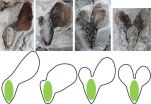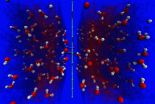Vitamin D may help prevent and treat diseases associated with aging, Loyola study finds
2015-03-17
(Press-News.org) Vitamin D may play a vital role in the prevention and treatment of diseases associated with aging, according to researchers at Loyola University Chicago Marcella Niehoff School of Nursing (MNSON). These findings were published in the latest issue of the Journal of Aging and Gerontology.
Researchers reviewed evidence that suggests an association between vitamin D deficiency and chronic diseases associated with aging such as cognitive decline, depression, osteoporosis, cardiovascular disease, high blood pressure, Type 2 diabetes and cancer.
"Vitamin D deficiency is a common, serious medical condition that significantly affects the health and well-being of older adults," said Sue Penckofer, PhD, RN, study author and full professor, MNSON.
Older adults are at risk for vitamin D deficiency due to diet, reduced time outdoors and poor skin absorption of the nutrient. With the number of people ages 65 and older expected to more than double from 2012 to 2060, the problem will become much more prevalent.
"Better understanding the relationship between vitamin D and chronic diseases in older adults and whether treatment of vitamin D deficiency can prevent or treat these disorders is important given the increasing number of people at risk for these health issues," said Meghan Meehan, FNP-BC '13, study author, MNSON.
The Institute of Medicine generally recommends that adults up to 70 years of age take 600 IU of vitamin D daily and adults over the age of 70 consume 800 IU of the nutrient daily.
Study authors concluded that as the older population continues to grow, universal guidelines for testing and treating vitamin D deficiency are needed. Research to examine the proper dosing of vitamin D supplements necessary to prevent the chronic diseases of aging also would have significant benefit for future generations.
INFORMATION:
ELSE PRESS RELEASES FROM THIS DATE:
2015-03-17
Hamilton, ON (March 17, 2015) - It's long been known that obese men are more likely to develop type two diabetes than obese women, but researchers at McMaster University have discovered it may be related to a difference between the sexes in the activity of a protein in the muscle.
As people become overweight, their skeletal muscle develops insulin resistance that can lead to type two diabetes. In a paper published by Scientific Reports today, the research team found the activity of this protein, called PTEN (for Phosphatase and tensin homolog deleted on chromosome 10), ...
2015-03-17
CORVALLIS, Ore. - Young, inexperienced drivers have always gotten into more automobile accidents, but if you add in a lot of distractions, it's a recipe for disaster - and a new Pacific Northwest research program is learning more about these risks while identifying approaches that may help reduce them.
Distractions have been an issue since the age of the Model T, whether a driver was eating a sandwich or talking to a passenger. But the advent of cell phones, text messaging and heavy urban traffic has taken those distractions to a historic level, say researchers, who ...
2015-03-17
The whirling, winged seeds of today's conifers are an engineering wonder and, as University of California, Berkeley, scientists show, a result of about 270 million years of evolution by trees experimenting with the best way to disperse their seeds.
The first conifer species that produced seeds that whirl when they fall used a variety of single- and double-winged designs. Whirling, or helicoptering, keeps a seed aloft longer, increasing the chance that a gust of wind will carry a seed to a clearing where it can sprout and grow unimpeded by competitors
"Winged seeds may ...
2015-03-17
The honeycomb structure of pristine graphene is beautiful, but Northwestern University scientists, together with collaborators from five other institutions, have discovered that if the graphene naturally has a few tiny holes in it, you have a proton-selective membrane that could lead to improved fuel cells.
A major challenge in fuel cell technology is efficiently separating protons from hydrogen. In a study of single-layer graphene and water, the Northwestern researchers found that slightly imperfect graphene shuttles protons -- and only protons -- from one side of the ...
2015-03-17
An atomically thin membrane with microscopically small holes may prove to be the basis for future hydrogen fuel cells, water filtering and desalination membranes, according to a group of 15 theorists and experimentalists, including three theoretical researchers from Penn State.
The team, led by Franz Geiger of Northwestern University, tested the possibility of using graphene, the robust single atomic layer carbon, as a separation membrane in water and found that naturally occurring defects, essentially a few missing carbon atoms, allowed hydrogen protons to cross the ...
2015-03-17
An analysis of genetic and lifestyle data from 10 large epidemiologic studies confirmed that regular use of aspirin or other non-steroidal anti-inflammatory drugs (NSAIDs) appears to reduce the risk of colorectal cancer in most individuals. The study being published in the March 17 issue of JAMA found that a few individuals with rare genetic variants do not share this benefit. The study authors note, however, that additional questions need to be answered before preventive treatment with these medications can be recommended for anyone.
"Previous studies, including randomized ...
2015-03-17
Among approximately 19,000 individuals, the use of aspirin and nonsteroidal anti-inflammatory drugs (NSAIDs) was associated with an overall lower risk of colorectal cancer, although this association differed according to certain genetic variations, according to a study in the March 17 issue of JAMA.
Considerable evidence demonstrates that use of aspirin and other NSAIDs is associated with a lower risk of colorectal cancer. However, the mechanisms behind this association are not well understood. Routine use of aspirin, NSAIDs, or both for prevention of cancer is not currently ...
2015-03-17
In a study in which pathologists provided diagnostic interpretation of breast biopsy slides, overall agreement between the individual pathologists' interpretations and that of an expert consensus panel was 75 percent, with the highest level of concordance for invasive breast cancer and lower levels of concordance for ductal carcinoma in situ and atypical hyperplasia, according to a study in the March 17 issue of JAMA.
Approximately 1.6 million women in the United States have breast biopsies each year. The accuracy of pathologists' diagnoses is an important and inadequately ...
2015-03-17
Older adults who had spine imaging within 6 weeks of a new primary care visit for back pain had pain and disability over the following year that was not different from similar patients who did not undergo early imaging, according to a study in the March 17 issue of JAMA.
When to image older adults with back pain remains controversial. Many guidelines recommend that older adults undergo early imaging because of the higher prevalence of serious underlying conditions. However, there is not strong evidence to support this recommendation. Adverse consequences of early imaging ...
2015-03-17
An additional 18 months of dual antiplatelet therapy among patients who received a bare metal coronary stent did not result in significant differences in rates of stent thrombosis (formation of a blood clot), major adverse cardiac and cerebrovascular events, or moderate or severe bleeding, compared to patients who received placebo, according to a study in the March 17 issue of JAMA. The authors note that limitations in sample size may make definitive conclusions regarding these findings difficult.
Current clinical practice guidelines recommend a minimum of only 1 month ...
LAST 30 PRESS RELEASES:
[Press-News.org] Vitamin D may help prevent and treat diseases associated with aging, Loyola study finds


